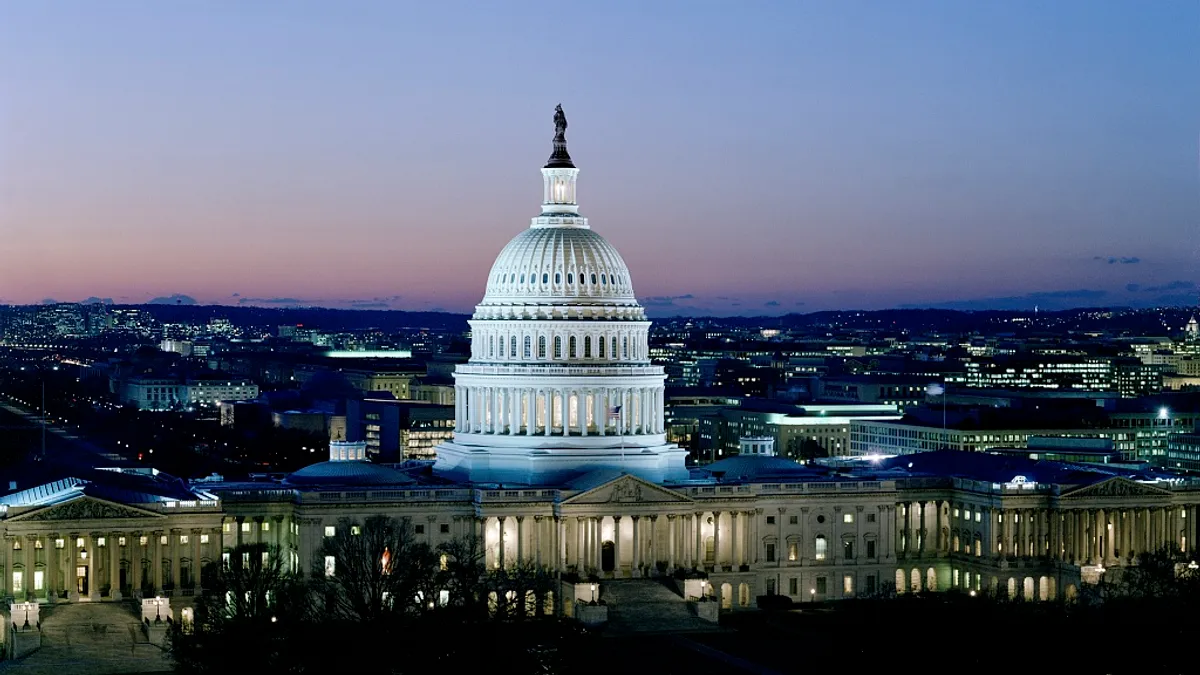Dive Brief:
- The Department of Energy's proposed rulemaking to provide cost recovery for fuel secure power plants dominated a hearing on power sector reliability and resilience at the House Energy and Commerce Committee on Tuesday.
- Nuclear and coal generation groups lent qualified support to the proposal to move merchant plants with a 90-day fuel supply to cost-of-service regulation, but said more evaluation of the rule is necessary. Natural gas, renewable energy, storage and environmental groups denounced the proposal and urged the Federal Energy Regulatory Commission (FERC) to extend its expedited evaluation period for the rule.
- The American Coalition for Clean Coal Electricity, a leading coal lobbyist, told lawmakers it believes FERC may have to take further action to support non-merchant coal plants not covered by the DOE proposal. The group's CEO said after the hearing that it did not push DOE to include cost recovery in its rulemaking.
Dive Insight:
Coal, nuclear and hydroelectric generators would be the greatest beneficiaries of the DOE's proposed rule, as each has the ability to draw from multiple months of fuel onsite. But even representatives of those industries expressed some reservations about the agency's Notice of Proposed Rulemaking, issued Friday.
The NOPR, which would grant "full cost recovery" to plants with 90 days of fuel supply onsite, sets a "good baseline" to begin talking about wholesale market reform, Nuclear Energy Institute CEO Maria Korsnick said. But, she added, "additional conversations need to be had through the rulemaking process."
The hydro industry does not support the rule as written, the National Hydropower Association told lawmakers. And while the coal lobby endorsed the proposal, the CEO of the American Coalition for Clean Coal Electricity said other reforms may be needed to support generators that are already under cost-of-service regulation.
"There's a large part of the coal fleet that's not covered [by the NOPR] that serves wholesale electricity markets that's not merchant," ACCCE CEO Paul Bailey told lawmakers. "We have a DOE rule that helps merchant coal and nuclear. There are other market reforms that could be undertaken to help those other fuel secure coal fired generating units."
After the hearing, Bailey told reporters ACCCE did not have specific policy proposals to support the plants, but they could broadly include a "resiliency product" in wholesale power markets.
"In fact, you could argue that's what should have happened anyhow," he said, "but we don't have time to do that right now."
Bailey said MISO and PJM told ACCCE that it would take two to three years to develop new resilience products. DOE likely set its aggressive schedule for the NOPR to save plants that could go offline in that time, he said.
"We can either short circuit this a little bit with what DOE has done or we can hope everything turns out okay after three or four years," he said after the hearing.
Despite NEI and ACCCE both calling for a "sense of urgency" to save at-risk plants, Bailey said the coal lobbying group did not propose to move any merchant plants back to cost-of-service regulation. In fact, he said, ACCCE has yet to fully evaluate the potential impacts of the NOPR on its members.
"The coal producers I'm sure would like that, the railroads would like that," he said. "We have to talk to utilities about how they would feel about it."
Like other market participants, Bailey was perplexed by the DOE's selection of 90 days as the benchmark for fuel supplies. Most coal plants have somewhere between 73 and 82 days of fuel today, he said.
"I just don't know whether it makes sense or not," he said. "If we average 73 or 82 over the last five years that's not a 90-day average, that's for sure. So that's one of the things we'll be looking at."
Coal generators could "presumably" increase their stockpiles to 90 days, Bailey said, but he has "no idea" where the number came from.
"Is it an annual average? Can it never dip below that for any period of time? There are a lot of questions about it," he said.
Those questions will have to be addressed quickly. DOE requested FERC finalize its NOPR within 60 days, and on Monday, FERC set an expedited schedule for evaluation, putting the comment for initial comments on Oct. 23.
11 energy trade groups — not including coal and nuclear groups — petitioned FERC to extend the evaluation schedule and hold a technical conference on the proposal. But on Tuesday the commission's general counsel told the Senate Energy and Natural Resources Committee that FERC will "take the appropriate action" on the NOPR within the timeframe established by DOE.
"We’re reviewing the options that are available and we are in the process of building the record by soliciting these comments and reply comments," General Counsel James Danly said. "Once they’re assembled we are going to review them and take the appropriate action with the timeframe established by the NOPR.”
What that action will be remains in question. While FERC could still extend consideration in response to the trade association petition, the DOE NOPR is being treated as a formal rulemaking process — rather than simply a subject for preliminary comments — meaning it could move to finalize a rule after the submission of reply briefs on Nov. 7.
"It is a proposed rule by the Energy Secretary – under section 403 of the DOE Reorganization Act the Secretary can propose rules," FERC spokesperson Craig Cano wrote in an email. "The Commission is gathering comments and reply comments on that proposal pursuant to the Oct. 2 notice in RM18-1."
This post has been updated to include comment from the Federal Energy Regulatory Commission.













